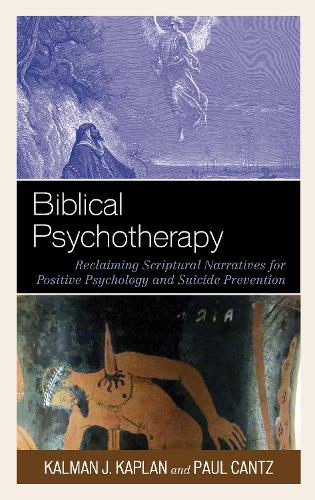
Biblical Psychotherapy: Reclaiming Scriptural Narratives for Positive Psychology and Suicide Prevention
(Hardback)
Available Formats
Publishing Details
Biblical Psychotherapy: Reclaiming Scriptural Narratives for Positive Psychology and Suicide Prevention
By (Author) Kalman J. Kaplan
By (author) Paul Cantz
Foreword by Thomas H. Jobe
Bloomsbury Publishing PLC
Lexington Books
29th November 2017
United States
Classifications
Professional and Scholarly
Non Fiction
Christianity
Religious counselling
Bible readings, selections and meditations
221.6
Physical Properties
Hardback
260
Width 159mm, Height 237mm, Spine 21mm
585g
Description
In Biblical Psychotherapy, Kalman J. Kaplan and Paul Cantz offer a new approach to suicide prevention based on biblical narratives that is designed to overcome the suicidogenic patterns in Greek and Roman stories implicit in modern mental health. More than sixteen suicides and self-mutilations emerge in the twenty-six surviving tragedies of Sophocles and Euripides and countless others occurred in Greek and Roman lives. In contrast, only six suicides are found in the Hebrew Scriptures, in addition to a number of suicide-prevention narratives. Kaplan and Cantz reclaim life-enhancing biblical narratives as alternatives to matched suicidal stories in Greek and Roman society with regard to seven evidence-based risk factors. These biblical narratives are employed to treat fourteen patients fitting into the outlined Graeco-Roman suicidal syndromes and to provide an in-depth positive psychology aimed at promoting life rather than simply preventing suicide.
Reviews
[This] book proves to be an interesting and compelling read. An engaged reading also tends to provoke the reader to utilize her ingenuity in exploring the religious- spiritual texts and narratives prevalent in specific cultures, and explore the feasibility of using these for constructing a meaning making framework for alleviation of distress and creating a fulfilled life. With a brilliantly enticing foreword by the prominent psychiatrist Thomas H. Jobe, the volume succeeds in building a firm ground for the novel approach that transcends inherent dualisms of modern psychological theory and practice, bringing together theology and professionalism, and promoting the wholesomeness of human experience through psychotherapeutic practice. * Journal of the Indian Academy of Applied Psychology *
Biblical Psychotherapy is a must-read in a time when science and culture question the phenomenon of suicide from different perspectives and pave the way to innovative approaches to reduce a major public health issue. Such new challenges can be fully understood when starting from a historical and spiritual background. Written by experts in the field, this book guides readers into the realm of biblical knowledge and allows for a very important experience of the wisdom of the Bible. This is a book for anyone interested in the human understanding of emotions and suicide, regardless of religion. Read it with the eye of mind, heart, and soul, and you will get important notions for grasping others' human experiences of difficult everyday-life circumstances. -- Maurizio Pompili, Sapienza University of Rome
Kaplan and Cantz offer tremendous hope and insight through this dynamic and creative book that presents biblically based alternatives to suicide. Challenging the narratives of Greek tragedy that undercut so much of psychological thinking, they engage with the biblical text in fresh ways that affirm the value of human life. -- Julie Exline, Case Western Reserve University
Author Bio
Kalman J. Kaplan is professor of clinical psychology and director of the Program for Religion, Spirituality, and Mental Health in the Department of Psychiatry at the University of Illinois, College of Medicine at Chicago and adjunct professor at the Spertus Institute for Jewish Learning and Leadership. Paul Cantz is associate professor at Adler University and clinical assistant professor in the Department of Psychiatry at the University of Illinois, College of Medicine at Chicago.
